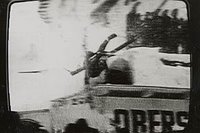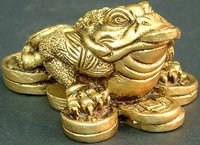
Vinko Bogataj is the former Slovenian ski jumper, who for more than a deacde represented one of the most famous (or rather infamous) images on American television. His notoriety resulted from a most spectacular wipe-out off of a ski-jump platform that was prominently featured on Intro to ABC's Wide World of Sports. Bogataj was representing Yugoslavia at the World Championships in the Bavarian resort of Oberstdorf in the spring of 1970. It was his third jump of the day. Visibly heavy Snow was falling and the ramp was fast. Midway down, Bogataj attempted to abort his jump, but unfortunately lost his balance and careened out of control, off the end of the ramp, tumbling and cartwheeling wildly, then crashing through a retaining fence near stunned spectators before coming to a painful halt. Fortunately - and surprisingly given the ferocity of the crash - Bogataj suffered only a mild concussion. Though he returned to jumping the next year, he never duplicated his prior successes and retired from competitition, becoming a ski instructor, and supplementing his income by operating a forklift at a factory in his native Slovenia. Ask any American over the age of 30 about this swatch of video history, and they will confitm that he was, and forever will be known as the vivid image of the "Agony of Defeat".
Nui Onoue has a similar story from the bubble years in Japan. Known to few outside that country, and even fewer amongst the new breed of momentum-humping stock jockeys under the age of 30, her crash and burn tale is worth recounting here for it's sheer bizarreness, if not it's side-splitting humour.
Mrs. Onoue is said to have started her "professional" life working as a hostess in and around Osaka. There, she befriended a wealthy and it is said, influential owner of a large construction company. She then reportedly parlayed funds derived from this relationship into a restaurant called "Egawa" in Osaka's entertainment district of "Sennichimae". On the fourth floor of this restaurant resided a room, which was a soon-to-become-famous oracle-like chamber. And inside this room, was the amphibious source of her secret and her rise to power.

Over time, Mrs Onoue had developed a reputation amongst her customers for prescient stock market purchases. Whether this notoriety was sheer luck, or whether it was the result of acting upon material non-public information glenaed from her sugar-daddy remains a mystery. It should be pointed out however that insider trading was not an incarcertaing offense nor did it take a genius to make money on the long side of the market during these heady bubble years. Nonetheless, her admiring customers were keen to know the secret details of her apparent golden touch. And so she would lead them upstairs to the room on the fourth floor. Once in the room, they would be led to court with a one-metre high ceramic toad alledgedly imbued with strong buddhist-derived spiritual powers. At this point, she would apparently ask them to lay their hands on its head whilst she chanted some mantras followed by the revelations the toad's wisdom (through Mrs. Onoue, of course, as the medium) borne in the form of stock market tips.
Those remembering the great bubble would admit that while just being long during these years was enriching, all stocks were not created equal. Some issues experienced inexplicably meteoric rises of exponential proportions, baffling fundamental analysts and laying waste to short-sellers in their path. Some were undoubdtedly related to the revelations of the toad. Word of the Buddhist Amphibian's prescience spread quickly and she was soon visited by senior executives from the largest banks and brokerage firms in the Japan, including amongst others IBJ, Nomura, Yamaichi. Gaijin author, Alex Kerr, in his writings about the bubble recounted that by 1991, IBJ alone had lent her YEN240bn (~US Dollar $2 billion) and another 29 banks and other lenders had advanced her nearly the same again. Neighborhood observers attested to the queue of limousines lined up outside the restaurant, whose occupants presumably were awaiting the toad's latest financial advice.
"Leverage is poison!", an adamant hedge-fund investor once cautioned me in the immediate aftermath of Long-Term Capital. Mrs. Onoue could have benefitted from THAT wisdom as the dramatic popping of the bubble which sent the equity markets tumbling, carried out Mrs. Inoue, her portfolio, as well as many of her lenders. In the trial that eventually followed as authorities looked for scapegoats, she was sentenced to a 12-year stint in jail, ostensibly for using fake CD's as collateral for the jumbo loans that funded her speculative operations. And there was much collateral damage, the most notorious being the chairman of IBJ, once one of Japan's most powerful men, who was forced to resign in shame as a result of his relationship with Mrs Onoue and, of course, the toad. A decade later, a reporter from London's Financial Times with a sense for the surrreal)went relic-hunting in Osaka, in search of the toad, with a less-than-successful outcome. And so its whereabouts remain a mystery.
For years Bogataj had little clue regarding his notoriety as ABC's image of the Agony of Defeat until he was tracked down by a Pulitzer-winning American sports-writer with keen sense of human interest. And his story, while momentarily tragic, played out happily. Mrs. Onoue too, one might speculate, has remained ignorant of her global infamy (and that of her toad). While it all may have been as truly delusional as it appeared, I could spoil this story with the hypothesis that she was simply the front-person and the "patsy" for a group of slick stock operators who themselves were caught-out by the decimation of the Nikkei at the turn of the decade in 1990. But I won't do that here. Because 15 years on, with the recovery in Japan's share prices still relatively nascent, and fragile, and probably dependent upon the continuation of the housing bubble in the US and the continued vigour of America's consumers, in order that China can continue its heady growth without wretching, Japan, the Nikkei, and it's investors need fairytales.




No comments:
Post a Comment